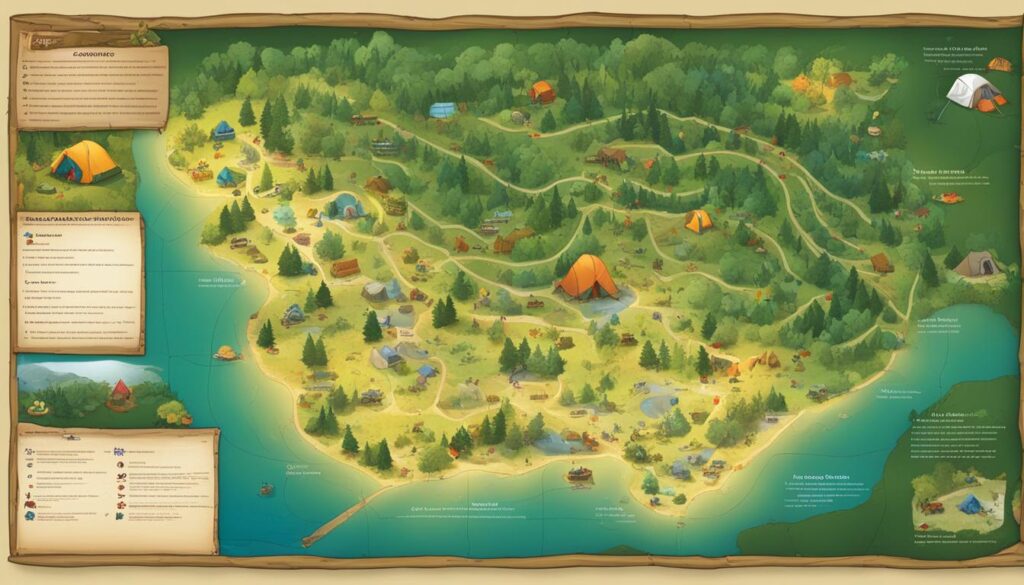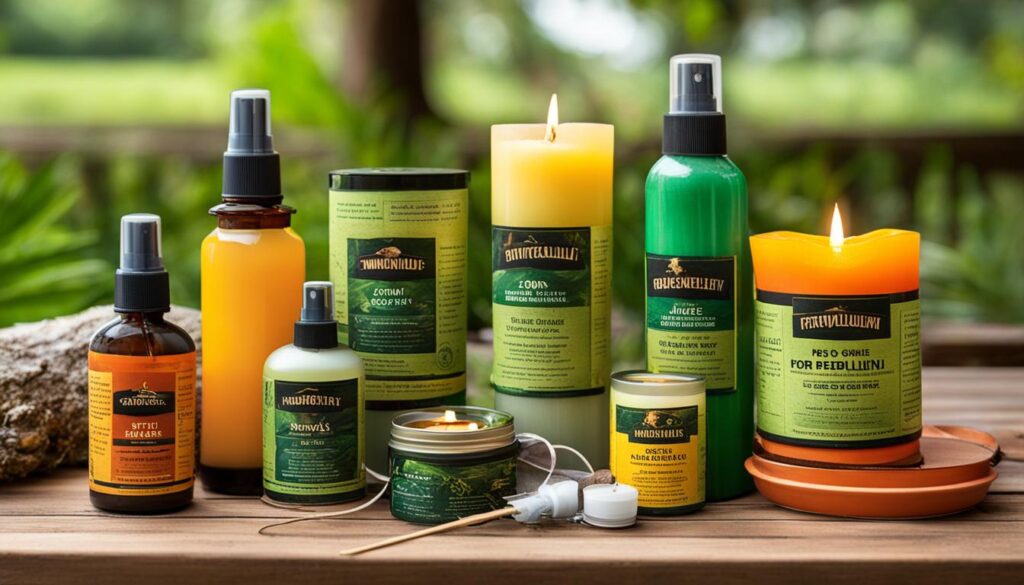Camping is a great way to enjoy the outdoors and reconnect with nature, but bugs can quickly become a nuisance. Whether it’s mosquitoes, flies, bees, spiders, or ants, these tiny pests can make your camping experience less enjoyable. However, there are many effective ways to keep bugs away while camping. By being prepared and utilizing natural bug repellents, you can ensure that your camping trip is pest-free and enjoyable for everyone.
Key Takeaways:
- Use bug repellent options like traditional sprays or homemade essential oil repellent.
- Consider using vinegar as a bug repellent or mixing it with dried herbs.
- Try bug-repelling bracelets, diffusers, coils, or certain bug-repelling foods.
- Utilize candles, lanterns, or campfires with bug-repelling herbs like sage or citronella.
- Stay hydrated, cover up, keep the campsite clean, and avoid stagnant water to prevent bug bites.
Educate Yourself on Common Camping Bugs and Their Risks
Before you head out on your camping trip, it’s important to educate yourself about the common bugs you may encounter and their potential risks. Mosquitoes, flies, bees, spiders, and ants are some of the most prevalent bugs that can disrupt your camping experience.
Mosquitoes, in particular, are notorious for their itchy bites and the potential spread of diseases such as West Nile virus and Zika virus. It’s crucial to protect yourself and your family from mosquito bites to reduce the risk of contracting mosquito-borne diseases.
Flies can be bothersome and may carry bacteria that can cause illnesses such as diarrhea. Bees, while important for pollination, can pose a risk if you or someone in your group is allergic to bee stings. Spiders and ants, although generally not dangerous, can still leave painful bites.
By understanding the risks associated with these bugs, you can take appropriate measures to protect yourself and your family. This includes proper bug repellent application, wearing protective clothing, and creating a bug-free campsite environment.
Remember, prevention is key when it comes to camping bug risks. Taking proactive steps to minimize bug encounters will help ensure a safer and more enjoyable camping experience.
Dangers of Mosquitoes and Mosquito-Borne Diseases
Mosquitoes are not only annoying, but they can also transmit diseases to humans. The most common mosquito-borne diseases include:
- Zika virus
- West Nile virus
- Dengue fever
- Malaria
- Chikungunya virus
Mosquitoes are active during dawn and dusk, so it’s important to take extra precautions during these times. Applying insect repellent and wearing protective clothing can help reduce the risk of mosquito bites and the transmission of diseases.

Risks and Prevention Tips for Common Camping Bugs
Here are some common camping bugs and their associated risks:
| Bug | Risks | Prevention Tips |
|---|---|---|
| Mosquitoes | Itchy bites, potential transmission of mosquito-borne diseases |
|
| Flies | Potential transmission of bacteria causing illnesses |
|
| Bees | Allergic reactions to bee stings |
|
| Spiders | Painful bites and potential allergic reactions |
|
| Ants | Painful bites and potential allergic reactions |
|
Effective Bug-Repelling Techniques for Camping
When it comes to camping, bugs can quickly become an unwelcome guest. Thankfully, there are several effective bug-repelling techniques you can use to keep these pesky insects at bay. Whether you prefer traditional bug sprays, homemade remedies, or natural repellents, there are options available to suit your preferences and needs.
Traditional Bug Sprays
Traditional bug sprays containing DEET are a popular choice for repelling bugs while camping. These sprays are effective against a wide range of insects and provide long-lasting protection. Be sure to follow the instructions on the product label for safe and effective use.
Homemade Essential Oil Repellent
If you prefer a natural alternative to traditional bug sprays, you can create your own homemade essential oil repellent. Essential oils such as thyme, eucalyptus, cedarwood, sage, catnip, geranium, lemongrass, rosemary, tea tree, cajeput, lavender, mint, basil, and citronella have bug-repelling properties. Mix a few drops of your chosen oils with a carrier oil like coconut oil or witch hazel, and apply the mixture to your skin before heading out.
Vinegar as a Bug Repellent
Vinegar can also be used as a bug repellent. Mix equal parts vinegar and water in a spray bottle and apply it to your skin or clothing. You can also infuse vinegar with dried herbs like lavender, mint, or rosemary for an extra boost of bug-repelling power.
Bug-Repelling Bracelets, Diffusers, and Coils
Bug-repelling bracelets, diffusers, and coils are convenient options for bug protection while camping. These products release bug-repelling substances like citronella or geraniol, creating a barrier of protection around you. Simply wear the bracelet, use the diffuser, or light the coil to keep bugs away.
Bug-Repelling Foods
Believe it or not, certain foods can act as natural bug repellents. Onions, garlic, and citrus fruits like orange and lemon are known to repel bugs. Incorporate these foods into your camping meals to help keep bugs at a distance.
Using Fresh and Dried Herbs to Repel Bugs
Burning herbs can also be an effective bug-repelling technique. Sage and citronella are particularly potent when it comes to repelling bugs. Simply light a bundle of dried herbs like sage and let the smoke deter bugs from your camping area. Alternatively, you can use fresh herbs like mint and basil to create a fragrant bug-repelling atmosphere.
| Bug-Repelling Technique | Effectiveness | Ease of Use | Natural Ingredients |
|---|---|---|---|
| Traditional Bug Sprays | High | Easy | No |
| Homemade Essential Oil Repellent | Medium | Moderate | Yes |
| Vinegar as a Bug Repellent | Low | Moderate | Yes |
| Bug-Repelling Bracelets, Diffusers, and Coils | Medium | Easy | Yes |
| Bug-Repelling Foods | Low | Easy | Yes |
| Using Fresh and Dried Herbs to Repel Bugs | Medium | Easy | Yes |
Remember to choose bug-repelling techniques that align with your preferences and comfort level. Experiment with different options to find the ones that work best for you, and enjoy a bug-free camping experience.

Additional Tips for Bug-Free Camping
In addition to bug-repelling techniques, there are some additional tips you can follow to ensure a bug-free camping experience. Staying hydrated is not only important for your overall well-being but can also help repel bugs, as they are attracted to sweat. Make sure to drink plenty of water throughout the day to keep bugs at bay.
Another effective way to prevent bug bites is by covering up. During dawn and dusk, when bugs are most active, wear long-sleeved tops and trousers to protect your skin. This can significantly reduce the risk of bug bites and discomfort.
Keeping your campsite clean is essential in warding off bugs and other pests. Dispose of food scraps properly and clean up any spills or messes immediately. This will help deter bugs from coming near your campsite.
Avoiding stagnant water is crucial in preventing mosquito infestations. Mosquitoes lay their eggs in still water, so avoid camping near lakes, ponds, or puddles. By eliminating potential breeding grounds for mosquitoes, you can effectively reduce their presence during your camping trip.
Using fans to create airflow can help keep bugs away. Bugs are not strong fliers, so having a fan running in your campsite can make it less inviting for them to settle. Set up a portable fan in your camping area to deter bugs and create a more comfortable environment.
Utilizing mosquito nets and screen rooms can provide an extra layer of protection against bugs. These barriers act as physical barriers, preventing bugs from entering your sleeping area or outdoor space. Make sure to set up mosquito nets or screen rooms around your sleeping area and any outdoor seating or dining areas.
Checking the mosquito forecast for your camping area can help you be better prepared for potential bug activity. There are several weather and bug forecast websites and apps available that provide information on mosquito activity levels. Stay informed about the mosquito forecast to plan your camping activities accordingly.
Finally, avoid wearing certain colors that attract bugs. Bugs are often attracted to bright colors, so it’s best to stick to neutral or lighter-colored clothing while camping. Colors such as red, orange, black, and cyan are known to attract bugs, so choosing clothing in different shades can help prevent bug bites.
By following these additional tips, you can enhance your bug-repelling efforts and enjoy a bug-free camping experience.
Protecting Against Ticks
While camping, it’s important to take specific measures to protect yourself from tick bites and tick-borne diseases. Tick prevention is crucial as these tiny creatures can transmit serious illnesses, like Lyme disease. To ward off ticks, I recommend using tick repellents containing DEET or natural ingredients like lemon eucalyptus oil. Apply the repellent to exposed skin and clothing before heading out on your camping adventure.
After camping, it’s essential to thoroughly check your body and clothing for any ticks that may have latched on. Focus on areas such as the scalp, armpits, and groin, as ticks are attracted to warm, moist areas. If you find a tick, use tweezers to carefully remove it, making sure to grasp it as close to the skin as possible. Gently pull upward with steady pressure to ensure you remove the entire tick, including the mouthparts.
Although most tick bites are harmless, it’s important to monitor the bite area in the following days. Look out for any signs of infection, such as redness, swelling, or a spreading rash. If you experience flu-like symptoms, such as fever, muscle aches, or fatigue, seek medical attention promptly. By taking these precautions and responding quickly if bitten, you can protect yourself from the potential risks associated with ticks.
FAQ
How can I keep bugs away while camping?
There are several effective bug-repelling techniques you can utilize while camping. These include using traditional bug sprays with DEET, creating homemade essential oil repellents, using vinegar as a bug repellent, wearing bug-repelling bracelets, utilizing bug-repelling diffusers and coils, incorporating bug-repelling foods into your meals, and using herbs, candles, lanterns, and campfires as bug repellents.
What are some additional tips for bug-free camping?
In addition to bug-repelling techniques, you can follow several additional tips for bug-free camping. These include staying hydrated, wearing long-sleeved tops and trousers during dawn and dusk, keeping your campsite clean and free of food scraps, avoiding stagnant water, using fans to create airflow, utilizing mosquito nets and screen rooms, checking the mosquito forecast for your camping area, and avoiding wearing colors that attract bugs.
How can I protect against ticks while camping?
To protect against ticks while camping, it’s important to use tick repellents containing DEET or other natural ingredients like lemon eucalyptus oil. After camping, you should thoroughly check your body and clothing for ticks, paying close attention to areas like the scalp, armpits, and groin. If you find a tick, remove it carefully with tweezers, making sure to remove the entire tick, including the mouthparts. Monitor the bite area for signs of infection or illness in the following days and seek medical attention if necessary.

